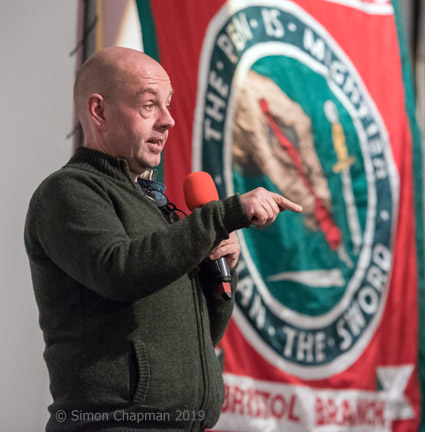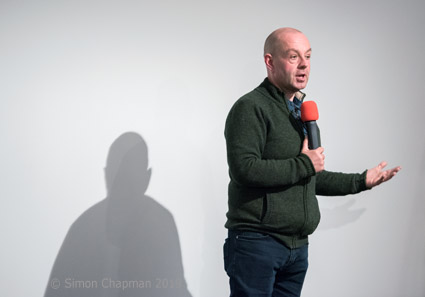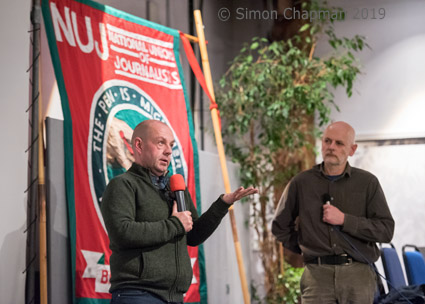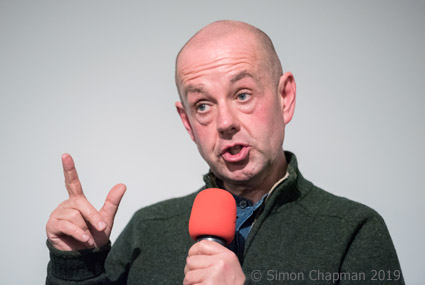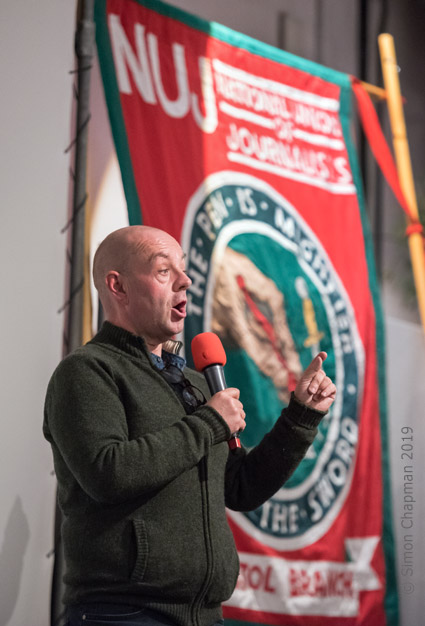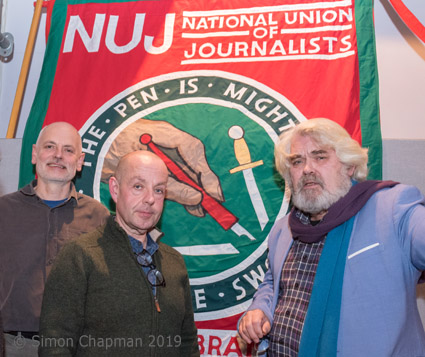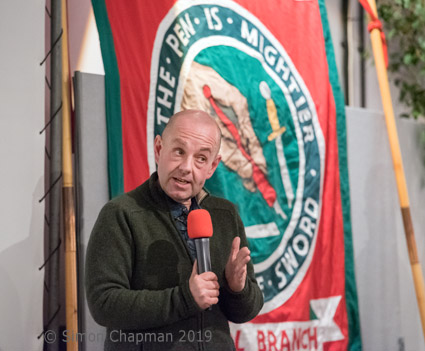
TWENTY FIVE years after the Loughinisland massacre of six men as they watched a World Cup match on TV in a Northern Ireland bar, the man named as their killer continues to go about his life running a pest control firm in Northern Ireland.
Even more astonishingly, he is still living with his wife, who he knows once informed on him to the police.
These were among the revelations at the first Bristol screening of No Stone Unturned, hosted by Bristol NUJ, at the Watershed on November 18.
The court case which followed promises to be the most important for decades in setting out the rules for the freedom of the press across the UK and will influence lawmakers across the world.
Barry McCaffrey – one of two Northern Ireland journalists behind the film – brought further gasps from the audience when he explained how he and colleague Trevor Birney were both arrested in dawn raids by scores of police officers under the Official Secrets Act.
Instead of police viewing the film and then acting on the information about the three alleged Loyalist killers, officers chose to target the journalists who had exposed them.
But, awkwardly for the police, the Official Secrets Act demands that for an offence to have been committed, damage has to be shown to someone’s reputation.
So it was that in Barry’s words, “the police asked me how I felt about damaging the reputation of the alleged killer!” Barry and his lawyer looked at each other in astonishment and asked the police to repeat the question, the Watershed gathering was told.
The audience was visibly moved by Barry’s account of his arrest by masses of armed officers – just as if he was a terrorist. Both he and Trevor Birney were taken to the second floor of Belfast’s Musgrave Street police station, reserved for serious criminals and terrorists, and the entire suite of cells cleared for their arrival.
Barry said that when he was left in his cell he lay under his blanket and cried – though he was soon cheered when he heard the loud voice of Trevor Birney in the corridor and knew he was not alone.
Barry paid tribute to the families of the six men who were slaughtered in the Heights Bar in Loughinisland in 1994. As the film shows, they have at least the reassurance that the Police Ombudsman of Northern Ireland has stated that there was collusion between officers of the state and the Ulster Volunteer Force, which is widely thought to be behind the killings.
Among the many failures in the police investigation, the killers’ getaway car was found but later destroyed, evidence from the area the car was found was never collected, and the prime suspect for the murders was not visited immediately – even though he lived a short distance from where the car was discovered.
Barry and Trevor faced Belfast High Court in May 2019, nine months after they were arrested and all their journalistic materials seized from their homes and their office.
This included millions of files and the names of contacts who had given their names in confidence – mainly for film projects entirely unconnected with Northern Ireland.
This was because the police seized everything they could find which held data – even a pink toy telephone belonging to Trevor’s daughter, Barry said.
In answer to questions, he said the police’s wholesale data grab put people at risk across the world, from Gaza to the US. Though the journalistic materials have now been returned – by court order – the police still have a copy on tape, and it will probably never be known if the files have been copied by the secret services of Britain and the US.
“The police told us that they automatically transfer their digital data to a backup tape,” Barry told the audience. “They claim they don’t know how to remove our date from the tape without spending £5 million!”
The most senior judge in Northern Ireland, Sir Declan Morgan, took a dim view of the police case when he gave his verbal judgement on May 31. He said everything the journalists had done – particularly in protecting the names of their confidential sources – had been done in “a perfectly proper manner with a view to protecting their sources in a lawful way.â€
The judge said the pair had acted in line with the Code of Conduct of the NUJ – which sets professional standards which all members are expected to follow, and is held up as an ideal of journalistic behaviour worldwide.
The court quashed the police search warrants after the judge heard that the journalists had informed the police six months before the film was released of all the information which they were going to reveal. The judge’s order meant the seizure of Trevor and Barry’s materials was illegal – and the retention of the data on the PSNI master tape is illegal too.
This issue will be tested in court on November 29, when the judge may also issue his final written judgement.
This will be important for journalists all over the UK, said Barry. “This isn’t about Northern Ireland, it isn’t about the Troubles,” he said, “it’s about freedom of speech.”
The written judgement will set out how far journalists are protected when they try to keep secret the information they gather – particularly the names of contacts who may be in danger if their identities become known.
This right is enshrined in Article 10 of the European Declaration of Human Rights. The same right is contained in the UN Declaration of Human Rights, and there has been interest in the case from around the world, drawing barristers to the Belfast court representing not only the NUJ but the BBC, other UK media groups, and the US Reporters Committee for Freedom of the Press.
Barry said he and Trevor asked themselves how “two idiots from Belfast” ended up attracting so much attention, describing how they have flown around the world to talk about the film, meeting US senators and members of Congress, as well as Star Wars director JJ Abrams and unlikely supporters such as former Conservative cabinet minister David Davis.
Barry also revealed how the years of work on the film with the families have taken their toll – both on himself and Trevor, and their families.
We owe them a debt, and we can only hope that the story of No Stone Unturned makes it clear how vital to a democracy is the freedom for investigative reporters to follow the evidence wherever it leads – without the might of the State being used to prevent them doing their job.
Paul Breeden
